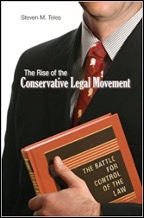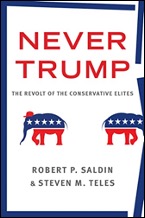

Steven M. Teles is a professor of political science at Johns Hopkins University and a senior fellow of the Niskanen Center whose research and writing includes much of interest, and offers much insight, to those who follow conservatism—and who follow, or practice, conservative philanthropy. While not a conservative himself, Teles’ acute observations about and analysis of the right and those who fund it have always been and remain sophisticated and thoughtful, as well as good-naturedly offered.
He contributed to the first edition of National Affairs in 2009 with an article that in part well-assayed the thinking and of Michael Joyce, the first president of Milwaukee’s Lynde and Harry Bradley Foundation, about an “empowerment approach” to conservatism and grantmaking.
Teles’ books include 2008’s The Rise of the Conservative Legal Movement: The Battle for Control of the Law; 2016’s Prison Break: Why Conservatives Turned Against Mass Incarceration, co-authored with David Dagan; 2017’s The Captured Economy: How the Powerful Enrich Themselves, Slow Down Growth, and Increase Inequality, with Brink Lindsey; and, most recently, last year’s Never Trump: The Revolt of the Conservative Elites, with Robert P. Saldin. Teles also co-edited Conservatism and American Political Development with Brian J. Glenn in 2009.
“[C]onservative public intellectuals who work for conservative magazines, think tanks, and public interest organizations find themselves in contact with a relatively small and self-selected group of wealthy conservative donors,” Saldin and Teles write in Never Trump.
That provides a material foundation for their work that serves as a buffer from the conservative mass public and also as the basis for a separate culture of elite conservatism—a culture in which Never Trump flourished. In 2016 that culture of elite conservatism was shown to have been more isolated than anyone had thought, as its organs struggled—it turns out unsuccessfully—to purge what intellectuals on the right thought to be a cancer in their movement.
Teles was kind enough to speak with me last week. In the first part of our discussion, we talked about the nature of philanthropic support for the conservative legal movement, what it can teach foundations now, and what grantmakers can do about “organizational disequilibrium.”
The 20-minute video below is the second part, during which he addresses “compassionate conservatism,” the Never Trump movement, and the post-Trump future of conservatism—including, quite straight-forwardly, how conservative philanthropy should consider the challenges of, and opportunities available in, facing that future.